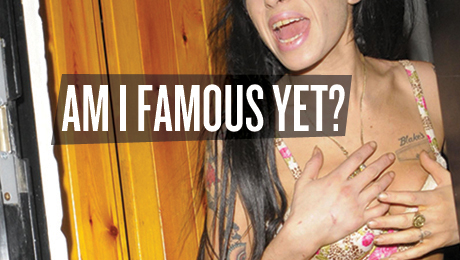
As difficult as it may be to imagine, I remain confident that there was once a time when children grew up with the aspiration to be something other than ‘famous’. It seems so far-fetched that at times I have suspected my memory of rewriting itself into an unlikely utopia where, alongside our ambitions to be known as singers, artists and actresses, my friends and I also dreamed of being things so uncelebrated as vets, nurses and teachers. Hard to believe, right? Now, add to that the fact that I am only twenty-four, and you start to get an idea of just how extreme the celebrity tsunami of the last decade has been.
It seems that the definition of ‘celebrity’ has changed over the last ten years. Once upon a time, fame was simply a by-product of great success. Literature, film, sport, music and politics had their bright stars: those few who excelled in their field gained attention and so became famous. It’s easy to envy the good luck of a rock star or sportsman, but in the infamous words of Samuel Goldwyn, “The harder I work the luckier I get,” and therein lies a clue. If fame was once a side effect of success, then success, rather than fame, was once the goal, and success takes real, honest hard work.
What we have seen happening throughout the Noughties is a surge of people who are famous for nothing more than being, well, famous. Paris Hilton springs to mind, as do Nicole Richie, Victoria Beckham, Peaches Geldof, Kim Kardashian and countless others. We all know their names, but what is less clear is why we know their names. Or, more to the point, why do we care?
You can look at it in terms of supply and demand, but it is not easy to work out which is the chicken and which the egg. In Hogfather, Terry Pratchett explores an interesting concept. The Hogfather, the equivalent of Father Christmas, disappears, leaving a surplus of belief floating around, with the result that all sorts of other entities spring into existence to supply the demand for things to believe in – like a gnome who eats one of each pair of socks, and one who visits people’s bathrooms leaving hair in plugholes. Are all these unnecessary celebrities a product of a similar surplus in our general consciousness – perhaps an excess of spare time or internet access? The ‘famous for being famous’ phenomenon has coincided with technological advances that mean there are literally thousands of channels and millions upon millions of magazines, websites and blogs that seem to have over-stimulated our need for information, no matter how inconsequential. Did the general public suddenly wake up one morning with a surplus of interest in the trivial details of the lives of insignificant people to which the media world simply responded? Or is the converse true, in that this thirst for ‘knowledge’ is just a manifestation of the highly concentrated availability of such information?
‘Reality’ television has a lot to answer for. American Idol, The X-Factor and the myriad other spin-off talent shows are all collaborators in the make-me-famous circus. Case in point: Susan Boyle. You Tube is another culprit, having come to play the role of a sort of fame lottery. Anyone with a video camera can now broadcast themselves to millions over the internet and if they are lucky enough to go viral then they have hit the overnight celebrity jackpot. Do we all remember “Leave Britney Alone”? Thought so.






